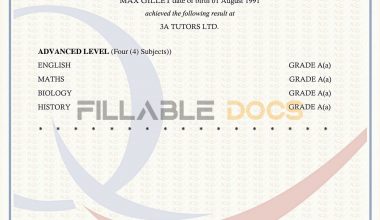The word “good” ranks among the most ambiguous words in the English language because it has so many distinct meanings to many different people. This is also comparable to how various people place varying levels of value on their GCSEs in their lives and careers. When you are aware of the GCSE grades that are considered to be good, you can think about your options and design your academic route.
In this article, we will talk about all GCSE grades most especially the good ones. We will also explain how GCSE grades are assigned and how they can affect your future and many more.
Let’s dive in!

Table of contents
- What are GCSEs?
- What’s the New GCSE Grading System?
- Why Did They Change the GCSE Grading System?
- What Do GCSE Grades 1-9 Mean?
- What is a Good GCSE Point Score?
- What is a Fail in GCSE?
- How Do They Assign GCSE Grades?
- What Do Good GCSE Grades Depend On?
- How will GCSEs Affect My Future Studies?
- FAQs
- Conclusion
- References
- Recommendations
What are GCSEs?
The General Certificate of Secondary Education (GCSE) is a subject-based academic qualification that secondary school students in England and Wales study throughout years 10 and 11.
For better understanding, read this article: What Does GCSE Stand For?
Now, let’s look at the grading system of GCSE.
What’s the New GCSE Grading System?
Each GCSE subject requires two years to complete, with students finishing coursework and tests at the age of 16, on average, to receive their final certification. In essence, these qualifications are the result of 11 years of education. They are crucial for various reasons, including the following:
- The core qualifications of Maths and English give learners essential everyday skills as well as academic knowledge
- There is a vast subject range, from practical to theoretical, helping learners decide on their career paths
- These Level 2 qualifications are often required as part of entry requirements for colleges and universities, and many employers want candidates to have GCSEs
- They act as a stepping stone toward further education, such as A Levels
In the past, these qualifications were graded on a scale of A* to G, with A* representing the best possible grade. A 9-1 grading scale is now in use.
So, how did we find ourselves here? Below, we’ve provided a timeline:
- 2017 – English Literature, English Language, and Math were the first subjects for which they introduced the reformed GCSEs.
- 2018 – Under the new structure, twenty more subjects were added, including History, Geography, certain foreign languages, and the Sciences.
- 2019 – An extra 25 new subjects were examined for the first time
- 2020 – They implemented the new number grading system for all GCSEs.
You can also check out this article: What is Uni Grades? The University Grading System Explained
Why Did They Change the GCSE Grading System?
To ensure that students acquire the skills and information necessary to succeed in whichever job path they select, the UK grading system was changed to be more rigorous and tough.
After a lengthy process including the Department for Education working with educational institutions, research centers, and businesses, they decided to alter the system. With this new grade system, there is more opportunity for differentiation because students can receive “higher” versions of any grade rather than just the standard grade. The adjustments also comprise:
- They will examine all courses at the end of the course as opposed to after modules during the course.
- There are more essay-style questions in the exams.
See also: GCSE Grade Boundaries Explained | All You Need to Know in 2023
What Do GCSE Grades 1-9 Mean?
The new grading scale is not just the numbered equivalent of A* to G, as some people may believe. The lettered scale is not entirely replaced by the 9-1 grading scale. This is due to:
- Some grades indicate a ‘strong’ grade as opposed to a ‘standard’ one
- For example, 9 is a strong A*, whereas in the traditional grading, you could only achieve a standard A*
See also: How Many Marks Is It To Pass GCSE Maths In 2023?
What is a Good GCSE Point Score?
Are you considering a good GCSE score in terms of individual grades or an average point score? Here it is:
- Individual: Anything above a 5 is seen as a good grade, hence, it would be considered a strong pass.
- Average: Your average score would be 6.5 if you took 10 GCSEs and received a grade 7 in five of them while receiving a grade 6 in the other five.
See also: What is Level 2 Merit GCSE Equivalent in Grades?
What is a Fail in GCSE?
The UK grading system, where U stands for “ungraded,” which was the same as the previous system, considers anything below a 4 to be a fail. There are options available to you if you at the time failed your GCSE examinations, including:
- Retake your qualifications through online classes or distance learning courses
- Study a Level 2 alternative in the form of Functional Skills
Read this article: What Happens If You Fail Your GCSE Exams?
How Do They Assign GCSE Grades?
They will send your GCSE exams off to be graded by examiners for each board after you’ve finished them. These examiners will assign you a grade depending on the work you did during the exam.
After that, another examiner will often moderate your paper and mark it. They do this to make sure that there isn’t any prejudice that could affect how well you perform overall. Subjects that rely more heavily on subjective essays, like English, need this more than others.
After they mark and moderate your exam papers, they then compare the results with those of other students nationwide. This is how the real grades you will receive on results day are calculated.
consequently, grade limits are not determined by the amount of marks you receive on each exam (and are consequently not consistent), but rather by how well you did generally in comparison to other year 11 students in the country. This implies that the same number of students will be able to receive the highest scores even if the tests are exceptionally challenging for one year.
See also: Guide to GCSE Exam Boards: Popularity, Pass Rates, and More
What Do Good GCSE Grades Depend On?
Your ability to work hard and be motivated is what will determine your GCSE grades, either good or bad. Success depends on motivation, and having the resources to make your revision just a little bit simpler and more fruitful will be priceless.
When deciding what factors are crucial to your success in school, there are a few more considerations to keep in mind. It’s crucial to note that your characteristics and the standards you set for yourself have a direct impact on your academic performance.
Managing your expectations is one of the ways you can reduce the amount of stress associated with completing your GCSEs. Avoid putting yourself under undue pressure to perform well in your examinations based on what other people expect of you. It can be quite easy to let other people’s opinions taint your own, something you should make every effort to avoid doing!
Additionally, you ought to make an effort to pinpoint the precise causes of your exam-related worry. Long-term, this could be quite helpful because it will give you the chance to work on the challenges you have in particular, and reducing the impact of these problems might just boost your exam performance by putting you at ease.
Finally, keep in mind that it’s not the end of the world if you don’t obtain the grades you were hoping for. Despite how discouraging it may be, you shouldn’t use this to define who you are. You should be proud of your accomplishments if you gave it your all and did your best.
See also: Last-Minute GCSE Revision Tips| Score Higher In Last-Minute
How will GCSEs Affect My Future Studies?
Having good GCSE grades is important as it will be useful for your future studies and career hunt. Below are how GCSE grades can affect future studies.
#1. GCSEs Can Determine the Sixth Form You Go To
Six GCSEs at a 7 or above are required for the most elite colleges, whereas entry criteria for school and college sixth forms range from four to five grade 5-4s, with 6-5s in the subjects you intend to study, to at least six GCSEs at 7 or above.
Your A-level performance is predicted by your GCSE performance. They are often used by sixth forms as part of a scoring system to determine how well you will likely perform on their course.
For instance, five GCSE marks of 5 or 6 and five GCSE grades of 4 or 5 could indicate that you will receive CCD at A-level, whereas straight 9–7 means that you will receive AAA.
Ask if they are willing to be flexible if you are concerned that your grades won’t be good enough for the sixth form or college you want to go to. If not, you may need to look into other options.
See also: Sixth Form Explained: from GCSEs to A-levels in 2023
#2. GCSEs Determine the Qualifications You Take Next
Some sixth forms may state that you cannot enroll in a particular course unless you received at least a 6 or 7 in your GCSE exam in that subject.
A sixth form might offer you a vocational program (which is more hands-on) such as a BTEC Level 3 qualification instead if your grades are primarily in the 4 or 5 range. The majority of colleges recognize BTEC qualifications.
#3. GCSEs Could be Used to Assess Eligibility for a Uni Course
The majority of university courses require at least a grade 4 or 5 in English and mathematics, regardless of the subject you intend to study.
If you have any doubts, inquire directly with institutions since certain university courses require certain subjects as well as specific GCSE scores.
However, if you elaborate on this in your personal statement, great A-levels might compensate for weaker GCSE scores, so don’t allow your GCSEs to stop you from applying to the university program you want.
See also: What is a Drop-in Session at Uni?
#4. GCSEs May Limit the Universities You Can Apply To
For the majority of their courses, some of the best academic universities, frequently those in the Russell Group, will require AAB or higher A-level scores.
It will be up to you to demonstrate your ability to obtain excellent grades because it is presumed that your GCSE and A-level outcomes are related. Grades 4 to 6 indicate Cs and Ds at A-level, which may not be sufficient to get admission to some colleges.
Hence, the need to have good GCSE grades to be able to apply to any university.
#5. GCSEs Can Affect the Career You End Up Doing
Having good GCSE grades also affects your career. A career-related degree may also have subject-specific entry requirements:
- Engineering courses such as chemical engineering: you’ll usually need A-levels or equivalent in chemistry and mathematics, and physics for other engineering courses, which in turn means you’ll need to have good GCSE grades in science and mathematics.
- Medicine: Competitive courses like medicine may ask for top GCSEs across the board for English, mathematics, and science subjects.
- Nursing and primary school teaching: grade 4 or 5 in GCSE English, maths, and science.
- Social work and secondary school teaching: grade 4 or 5 in GCSE English Language and Mathematics.
If you’re searching for part-time jobs at a university or college, you can also include your grades on your CV/resume.
See also: What A-Level Qualifications Do You Need to Be a Therapist?
FAQs
Entry requirements for school and college sixth forms vary – ranging from four to five grade 5-4s, with 6-5s in the subjects you want to study, through to at least six GCSEs at 7 or above for the most selective colleges. Your GCSEs are used as an indicator of how well you could do at A-level.
They are now graded 1-9 (9 is the highest). Grade 9 is higher than the previous A*, a 4 is accepted as a pass for most Level 3 college courses, and a 5 is regarded as a strong pass.
The percentage needed for a grade 9 varies from year to year, depending on how other examinees have done. Grade 9 is generally awarded to those in the top 5% or 1 in 20 candidates. Know what you’re aiming for and review back to your existing marks and what percentage score you need in the exam to score a 9.
Conclusion
In a world where knowledge is power, good GCSE grades serve as a stepping stone towards a brighter future.
From unlocking educational pathways to enhancing career prospects, these grades wield immense influence.
However, it’s important to remember that while good grades are commendable, they are not the sole measure of success. Strive for personal growth, embrace challenges, and keep your eyes on the horizon of opportunities that lie ahead.
References
- Theuniguide.co.uk – How important are your GCSE grades?
- Thinkstudent.co.uk – What Are “Good” GCSE Grades?
- Stonebridge.uk.com – The GCSE Grading System: Everything You Need to Know
Recommendations
- The 10 Most Popular GCSE Subjects | 2023 RankingWhen Do GCSEs Start And Finish in 2023?
- What to Do if You Fail Your GCSEs in 2023 | Expert Advice for 2023
- What Are Level 4 Qualifications Equivalent in Grades in the UK?
- How Many Marks Is It To Pass GCSE Maths In 2023?
- What is Uni Grades? The University Grading System Explained






